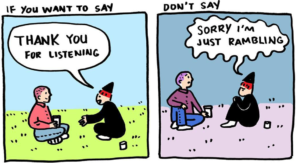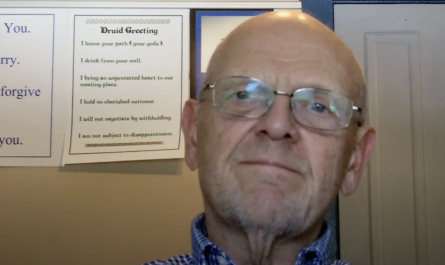 Have you ever thought of the various uses of “I’m sorry”?
Have you ever thought of the various uses of “I’m sorry”?
There are people who perpetually apologize for things that don’t warrant an apology—sometimes they’re just prefacing a simple sentence, like “I’m sorry, can we have a conversation about your time card for last week?”
Or they say “I’m sorry” every time they pass someone closely in a hallway. For these people, it’s a trained reaction. My experience has been that these folks learned this at an early age and frequently beat themselves up about not executing their lives to perfection.
Headline: You don’t owe me an apology for passing me in a tight hallway, or for expressing your opinion, or for asking to engage me in a meaningful discourse.
I currently have an annoying habit of uttering “I’m sorry?” when I can’t quite hear what you’ve said. It’s in place of being clear and saying, “My seven-decades-old ears aren’t what they used to be and I simply didn’t pull out of the noise what you said. Could you please repeat it?”
The idea of apologizing for each self-perceived lack of perfection I think in many cases can be traced back to people who had difficulty pleasing Mom or Dad. It became a Knower/Judger decision when they needed an emotional “pillow” to soften the criticism they just “knew” was coming (whether or not it actually came).
While researching this topic, I heard about the “sorry jar” phenomenon. I actually saw a piece on the news about it this week. It works like the “cussing jar,” in which participants tossed a quarter or a buck or a $10 bill every time they cursed, in an effort to break the habit. The “sorry jar” instead collects from those who utter uncalled-for sorrys. I’m told it’s popular in offices all around St. Louis presently.
Is this you?
Now to the other end of the spectrum—those of us who fail to express regret when sorry really is called for.
I’m guilty of this one as well. I’ve spent a great deal of my life trying to do the “right” stuff. And sometimes I’m still way off base.
Apologies, in general, work. They are valuable in legal negotiations. They tend to bring the conversation to a Learner/Researcher tone rather than a K/J versus K/J rant. I think in general we all realize that.
Then why do I (or we) find it difficult to apologize?
Psychologists believe apologies are thermometers of the ego—our K/Js, if you will. When I refuse to apologize, it actually makes me feel more empowered. That power and control translates into greater feelings of self-worth. As strange as it seems, people who refuse to apologize end up with boosted feelings of integrity.
Crediting our ability to set aside our K/J comfort zone of the power-grab “non-apology,” Dr. Denise Cummins hypothesized in a Psychology Today article several years ago:
On the way to adulthood, we learn that apologizing isn’t groveling or debasing one’s self. Instead, the reason we apologize is to make the person we intentionally or unintentionally harmed feel better, not to make ourselves feel better. An apology means “I see you were harmed by my action, and that matters to me.” [emphasis mine]
So I seem to be able to get in trouble apologizing when it’s not called for AND not apologizing when it is.
I can fix all that by addressing my K/J rules on the subject and staying clearly in my L/R. So can you!




